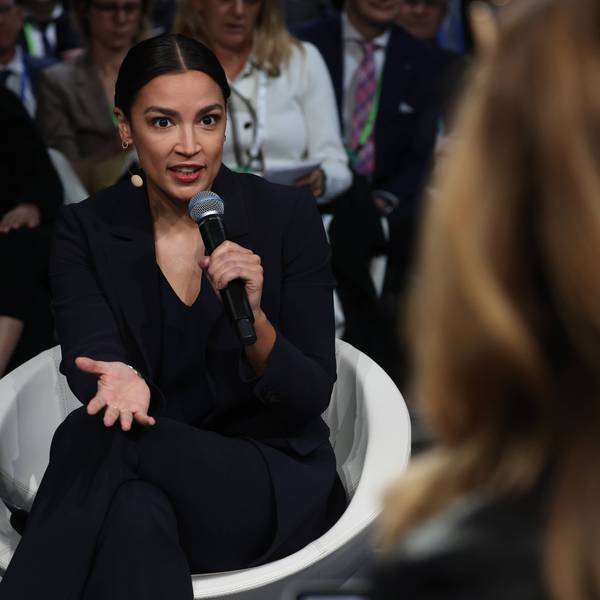Nancy Pelosi called a press conference last week during the House Democratic Caucus retreat in Baltimore. She announced the House Democratic message: "We believe that Americans should have an economy that works for everyone, not just the privileged few."
If this sounds familiar, you're right.
In her convention speech, Hillary Clinton called for "a country where the economy works for everyone, not just those at the top." Announcing her campaign, she promised to make our "economy work for every American."
The problem with this economic framing is that it fails to acknowledge that within "everyone" there are bad actors. There are powerful interests attacking working class people. Promising to work for "everyone" fails to answer the most fundamental question in politics: When there is a fight, whose side are you on?
Donald Trump had almost no policies in his campaign. But he had a message - a story with villains.
His closing TV ad bashed the "failed and corrupt political establishment...the same group responsible for our disastrous trade deals, massive illegal immigration, and economic and foreign policies that have bled our country dry." He criticized "a global power structure that is responsible for the economic decisions that have robbed our working class, stripped our country of its wealth, and put that money into the pockets of a handful of large corporations and political entities."
" Donald Trump had almost no policies in his campaign. But he had a message - a story with villains."
Pelosi unintentionally promised to fight for "every one" of the villains voters hear described by Trump. And while Trump's narrative includes hollow promises and includes xenophobic scapegoats, Democrats may be on the verge of failing yet again to offer a better story with a more compelling set of villains - such as Wall Street banks that defraud the public and oil companies that pollute communities and give people asthma and cancer.
The recent House Democratic retreat revealed other warnings that Democratic leadership may not be fully seizing this moment - and may forfeit the opportunity to win back the House majority in 2018.
In addition to uninspiring messaging, House Democratic Leadership took a step in the wrong direction by inviting a mouthpiece for one of the villains to directly give strategic advice to the Democratic Caucus.
Third Way is a think tank that, by its own admission, is funded by the very Wall Street interests infecting Trump's cabinet. Third Way is well known for attacking Sen. Elizabeth Warren in 2013 when she endorsed expanding Social Security benefits - an overwhelmingly popular policy among Republican, Independent, and Democratic voters that is unpopular only with Wall Street banks that would benefit from privatizing Social Security. This attack led current House Democratic Caucus Chair Joe Crowley (D-NY) and other members of Congress to remove their names as Honorary Co-Chairs of Third Way.
Freshman Rep. Ro Khanna (D-CA), who represents many entrepreneurs in Silicon Valley, vocally challenged Third Way at the retreat. He told reporters afterwards, "I think the way to win is to be clear, to be bold, to be progressive, to look at where Warren and Sanders are taking the party." Khanna said the party should "listen to the visionary voices."
"The Democratic Party must consistently be the party of working people by challenging corporate excess, a rigged economy, and specific villains in every community."
As they heard from a corporate think tank, Democratic Leadership showed zero interest in hearing from or collaborating with grassroots progressive groups that organize millions of people and have their finger on the pulse of the resistance happening around the nation.
Third Way co-founder Matt Bennett offered an explanation of why Democratic Leaders spotlighted their views at the retreat. He said "the leadership...are interested in a bigger, more inclusive party" and "only a big-tent party can return to the majority." Rep. Jim Himes (D-CT), chair of the pro-corporate New Democrat Coalition, also called for "people who have very different backgrounds, who use different language, who emphasize different things."
This misunderstanding of a big tent as something that includes "everyone" - even the villains - could lose House Democrats many key races in 2018. Diversity of backgrounds is absolutely necessary. Diversity of language to describe core Democratic themes is fantastic. But the Democratic Party must consistently be the party of working people by challenging corporate excess, a rigged economy, and specific villains in every community.
Democrats will win if they challenge big agri-corporations who threaten family farms in rural areas like South Dakota, challenge the pharmaceutical industry in areas with aging populations like New Hampshire, challenge big banks in areas with high foreclosures like Nevada, challenge Big Oil in places where clean energy is key to economic growth like New Mexico, and challenge the Big Telecom monopolies that refuse to improve horrible Internet and phone service in communities within every state. And they must go on offense with a vision of high-paying jobs, a strong social safety net, and an economy where workers get a bigger piece of the pie.
Democrats can win back the House in 2018 if the newly-engaged people who are flooding protests and town-hall meetings around the nation feel inspired enough by Democrats to march to the polls. But the people in the streets want to vote for heroes. And heroes fight villains.



